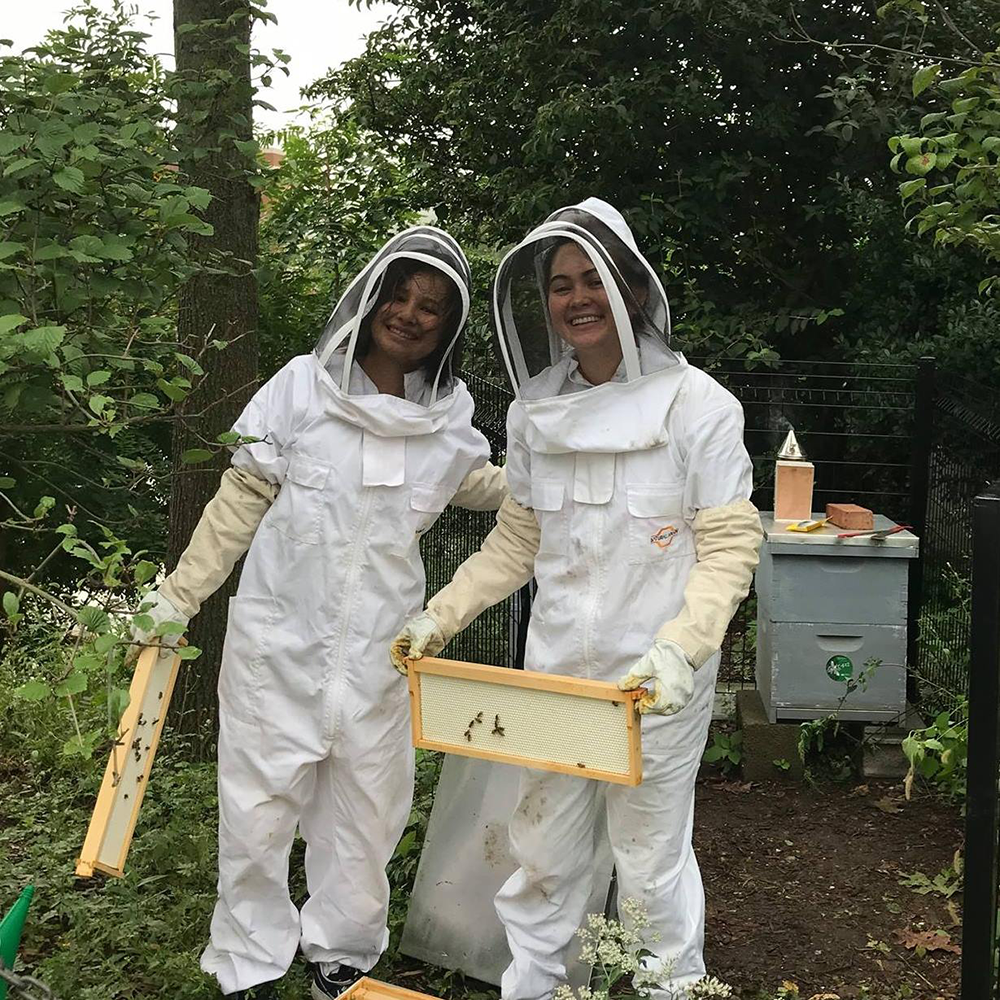A team of students, faculty and staff is applying for a designation this fall that would recognize Georgetown University’s commitment to protecting pollinators by making it the first “Bee Campus” in Washington, D.C.
The designation is granted by the Xerces Society, an international organization that focuses on the conservation of organisms essential to biological diversity and the well-being of ecosystems. If given the designation, Georgetown will join more than 80 other educational institutions as a Bee Campus, which requires the university to make seven commitments in support of bees and other pollinating insects.

To become a Bee Campus, Georgetown must establish a committee of students, faculty and staff as well as host awareness events, sponsor student service-learning projects, offer pollinator-focused workshops, post signage to educate the campus, maintain a website and apply annually for a renewal, according to Bee City USA.
Science, Technology and International Affairs Professor William Hahn, who is the Bee Campus project lead, stressed the significance of Georgetown becoming D.C.’s first Bee Campus by being dedicated to conservation efforts.
“Washington DC is already a Xerces Society Bee City so it is natural to have Georgetown as a Bee Campus,” Hahn wrote in an email to The Hoya. “Being first in the area shows leadership and commitment to environmental action.”
As a top university, Georgetown has the responsibility to support environmental conservation efforts, according to Allyse Smith (NHS ’21), a member of Hoya Hive, Georgetown’s beekeeping organization.
“Georgetown is recognized as a leading institution in many ways so it is important that the campus supports a healthy ecosystem,” Smith wrote in an email to The Hoya. “By becoming an established Bee Campus, it is a commitment to protecting pollinators and local plants.”
Hoya Hive, which is a part of the Georgetown Renewable Energy and Environmental Network, maintains two bee hives on campus near the Observatory. The current hives were installed in May 2018.
Through the Xerces Society’s Bee Campus program, the university hopes to protect native pollinators and increase awareness regarding conservation issues, according to Hahn.
“We are using this framework to coordinate existing activities at Georgetown (gardens, the student beekeeping club Hoya Hive, ecology and other courses, etc.) to further develop the campus as an environmental education resource,” Hahn wrote.
The Bee Campus program places a particular value on education, according to Pharmacology and Physiology Professor Adriane Fugh-Berman, who is on the Bee Campus committee.
“Many urban students know little about plants and pollinators, so this is a wonderful opportunity for teaching and learning about native bees, other pollinators, and how important they are to the future of food,” Fugh-Berman wrote in an email to The Hoya.
The project will offer students more application-based learning in the classroom that will give them real-world experience, Hahn wrote.
“As we develop our project students will be able to participate in courses and other activities centered on pollinator biology, hands-on beekeeping, biodiversity studies, urban sustainability, and food/agriculture,” Hahn wrote.
One course, “Conflict and Coexistence: At the Interface of Humans and Nature,” allows students to connect material learned in class to real problems happening in the world, according to STIA Professor Cynthia Wei.
“This campus pollinator project (of which Bee Campus USA is a part) has provided a nice opportunity for students in my course to contribute to an ongoing conservation project on campus, and to connect what they are learning in class to a real-world problem,” Wei wrote in an email to The Hoya.
The overall project is a rewarding experience because it integrates student interests with what they are learning in classes, according to Smith.
Elizabeth Nguyen (SFS ’21), president of Hoya Hive, said the initiative aligns perfectly with what she is currently studying and will help her achieve her goals for conservation beyond Georgetown.
“In the future, I hope to work on the intersection of sustainability and development so being a part of the Bee Campus project gives me insight into how we can best implement strategies benefitting both ecosystems and human needs through increased pollination for crops and the ecosystem services the natural world provides,” Nguyen wrote in an email to The Hoya.
The Laudato Si’ Fund, a $300,000 fund that supports sustainability projects and programs that create a healthier and more biologically diverse local ecosystem, has been used to achieve the Bee Campus initative’s goals. The Bee Campus project received a grant of $26,153, according to Hahn.
The grant has allowed the initiative to develop a program website, which is expected to be launched by the end of the semester, and cultivate gardens in different locations, including under the Leavey Esplanade and on the medical campus podium. The funding was also used to develop new beekeeping courses and include students in activities like beekeeping, native plant gardening, honey harvesting and community outreach, according to Hahn.
Additionally, receiving the Laudato Si’ grant further publicized Georgetown’s pollinator protection efforts, according to Nyugen.
“The publicity has also been great for both the club and the overall initiative,” Nguyen wrote. “The goals of Bee Campus are really to reach as many people as possible in order to protect our native pollinators and the Laudato Si’ fund has provided us with the resources to impact more people and thus more pollinators as well.”
Georgetown plans to submit its full request to become a Bee Campus to the Xerces Society this semester and hopes the conservation project will continue in subsequent years.
“We will continue to develop our activities and the full request to Xerces for Bee Campus recognition will be sent in this Fall,” Hahn wrote. “The overall project (gardens, courses, etc.) will hopefully continue for many years.”




















